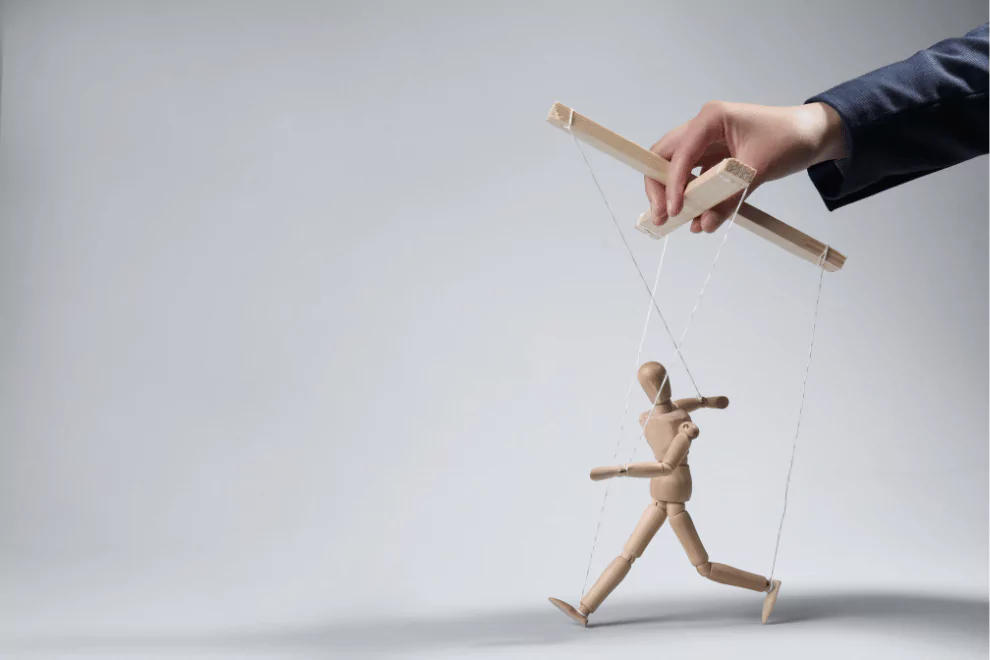Key Points
- Narcissism is a personality disorder marked by extreme self-importance and belittling others to gain power.
- Dating a narcissist begins with love bombing and enters a vicious cycle of devaluation, where victims typically stay as they search for the rush of affection they felt at the beginning.
- Not everyone who shows signs of narcissism is a narcissist but be aware of narcissistic tendencies in your partner.
- Avoid dating a narcissist or end the relationship when you realize they’re a narcissist to heal and protect your mental health and find a healthy relationship.
Dating a narcissist is challenging and emotionally damaging. Narcissists have difficulty forming true, meaningful connections as they manipulate partners. Be aware of the warning signs when dating and showing emotional vulnerability.
It’s common to have narcissistic tendencies without being a narcissist. Be careful not to throw the title around freely, as it requires a doctor’s diagnosis. However, narcissistic tendencies cause similar damage to relationships even if you’re not dating a narcissist.
Learn about the warning signs and protect yourself from manipulative behavior.
What Is a Narcissist?
A narcissist has an inflated sense of self-worth and a lack of empathy for others. They need constant attention and admiration from others. Narcissists often exhibit arrogant and entitled behavior.
Narcissists believe they have a sense of power and exaggerate their accomplishments or abilities. They’re unable to accept criticism due to their inflated self-image. Narcissists become easily upset when they don’t get the special treatment they believe they deserve.
Narcissism is a diagnosable personality disorder. The term narcissist often describes someone self-centered, but a true narcissist has a deeper psychological issue. Narcissists struggle to form meaningful connections affecting their personal and professional lives. They often manipulate or deceive others to fulfill their own need for admiration and validation, typically without being aware of their damaging behavior.
Narcissistic personality disorder (NPD) varies in severity, and it’s possible to show traits without a clinical diagnosis. This disorder is more common in men and difficult to diagnose. NPD is difficult to treat as patients rarely notice the fault in their personalities and are stubborn to change. When someone seeks help for NPD, they often actually come for help with depression or substance abuse. Talk therapy is the most widely accepted treatment for NPD.
The cause of NPD is unknown, but some possible causes include environmental factors, genetics, and neurobiology. Over-attentive or under-attentive parenting is another cause of NPD development. Some effects of NPD include relationship issues, turmoil in work or school, depression, anxiety, eating disorders, substance abuse, and suicidal thoughts.
If you or someone you love displays symptoms or signs of narcissism, seek a mental evaluation from a professional. Although there is no cure, there are treatments and management plans available.
Signs of Narcissistic Behavior
It’s difficult to diagnose someone as a narcissist. Be careful not to accuse loved ones of having such a disease but encourage them to see a professional.
Narcissists are rarely aware of their narcissistic tendencies, even if it’s obvious to those around them. Tread lightly when approaching the subject and maintain your compassion for those living with a personality disorder. Have compassion, but never let it come at the cost of your safety or well-being.
Here are some top signs that someone’s a narcissist:
Dictating Conversations
One of the most obvious signs of NPD is dictating conversations.
Narcissists want to be the center of attention and tend to disregard the needs of others. This includes talking over others, interrupting, not listening when others speak, and focusing the conversation on themselves. They’re unaware of this behavior, even when it’s obvious to those around them.
Dictating conversations is the first roadblock for narcissists in trying to form connections in their personal or professional lives. You can’t form a genuine connection with someone so focused on themselves that they neglect you.
Vanity
Although it’s essential and healthy for everyone to be confident in their appearance and proud of their accomplishments, excess pride becomes vanity. This manifests differently for narcissists, but generally, they show vanity for their appearance and life.
Vanity is excessive pride in oneself. This applies to physical appearance, achievements, talents, and overall personality. Narcissists pay extra attention to their appearance due to their need to always look their best. They spend excessive time looking in the mirror and doing their hair. They love how they look and often believe they’re superior to others.
People with NPD boast about their achievements or abilities. They want to reassure themselves of their accomplishments and gain admiration from others.
In addition to seeking the spotlight for themselves, narcissists belittle others to emphasize their greatness further. Their lack of empathy leaves them clueless about how this makes others feel.
Rule Breaking
Narcissists often break rules and believe there are no consequences for them. Narcissists sidestep rules because they feel entitled to special treatment.
They drive like a speed racer and find it amusing. They engage in petty theft and show it off to their friends. They cut to the front of the line at the movies, disregarding everyone else. They seek special treatment when caught breaking the rules or love the attention they receive for doing it.
Belittling
A narcissist belittles those around them to gain superiority. These belittlements come in rude comments, sabotage, criticism, and cruel jokes. They make fat jokes to someone insecure about their weight. When confronted with turmoil by a partner, they gaslight and flip the situation. If someone else shares a recent accomplishment, they attempt to one-up them with something more impressive.
Narcissists make sarcastic comments about sensitive subjects and then insist it’s a joke if others are offended. A narcissist claims someone is “too sensitive” and lacks empathy when they hurt a loved one.
Blame Game
To narcissists, nothing is their fault. They constantly place blame on other people and cannot recognize their faults, even in minor situations. This blame game pushes others down to gain superiority and allows them to gain power in relationship dynamics.
By blaming others, a narcissist takes no responsibility for their actions. They’re incapable of seeing their involvement in negative situations or considering that they’ve done wrong.
There’s Always a Catch
A narcissist is selfish by nature and has ulterior motives, even when doing something seemingly kind. They rarely do something for a loved one without some kind of expectation in return.
Sometimes a narcissist knows what they want in return upon giving a gift or acting kindly. Other times, they save this as collateral for later when they need something from you. Some narcissists intentionally give so much in a relationship that a partner becomes dependent on them. This is to ensure the partner stays with the narcissist.
Narcissists act overly kind to others to portray themselves as caring individuals. They work to maintain their image as a generous and loving person. This is difficult to see through at times but becomes obvious after spending extended time with someone who acts this way.
There is no selfless good deed to a narcissist. There are always strings attached, whether they expect something in return now or save it as collateral for later.
Stages of a Relationship With a Narcissist
Everyone faces relationship problems, but the course of a relationship with a narcissist is unique and challenging. It’s difficult or impossible to tell when you start dating if someone has NPD or narcissistic tendencies.
If you find yourself in a relationship with a narcissist, it likely goes through these stages:
Idealization
Narcissists are famous for love-bombing at the beginning of a relationship for victims to form a dependence on them. This idealization is the first red flag that someone you’re dating has NPD or narcissistic tendencies.
A narcissist puts on a perfect version of themselves at the beginning of a relationship. They shower a partner with attention and affection. They appear to be an ideal partner and make you feel like an ideal partner.
“Love bombing” is a manipulative tactic of showering someone with affection early in a relationship, leading to intense feelings of love and admiration. A narcissist makes a partner feel like they’re the best thing since sliced bread, and it’s easy for anyone to fall victim to this adoration. Victims of love bombings typically reciprocate these intense emotions and form an idealized image of their new partner. This begins the toxic relationship cycle of addiction to the narcissist’s affection.
After the intense beginning of a love bomb wears off, the pursued stays in the relationship, searching for the rush they felt at the start. The narcissist promises this thrill will return and gives small doses after turmoil to keep the victim coming back for more. Knowing that the victim won’t leave them eases the narcissist’s fear of abandonment.
Devaluation
After the initial fun of the love bombing stage wears off, the relationship enters a stage of devaluation. In a normal, healthy relationship, the honeymoon phase wears off, and real intimacy begins to grow as partners value each other more deeply. However, a narcissist sees less value in a partner during this second stage.
Once their partner is fully committed, a narcissist stops providing intense levels of affection. Instead, they start to devalue and belittle their partner. Things they used to complement their boo about are suddenly points to make fun of or criticize. If their partner pushes back, the narcissist gaslights their partner and belittles them further.
The narcissist withdraws emotionally from their new crush, leaving them confused or rejected. They hold back intimacy and affection in an attempt to manipulate their partner. Victims feel emotionally devastated as the perfect view they had of someone fades. Narcissists control this stage by providing just enough love to comfort the victim without reassuring them entirely.
A toxic cycle begins here in narcissistic relationships. As the victim’s self-esteem plummets, they depend even deeper on the narcissist and remain in their abusive relationship.
Be careful of devaluation; don’t allow anyone to treat you less than you’re worth.
Rejection
Narcissists search for relationships that feed their ego and self-image. When a relationship is no longer fulfilling this backward intention, the narcissist discards the relationship and looks for someone new.
A narcissist drops partners without warning, possibly even to the level of ghosting someone. Others push a partner away until they end it themselves to maintain the upper hand.
This is incredibly hurtful and heartbreaking to the victim, who wonders what they did wrong. However, rejection is never a reflection of your self-worth. It’s a blessing in disguise for such a toxic relationship to end.
What To Do if You’re Dating a Narcissist
Having a relationship with a narcissist is difficult and may be damaging in a number of ways. Narcissists lack empathy and the ability to form deeper connections. Even so, it’s easy to fall victim to their love bombing and surface-level generosity.
Be aware of the signs of narcissism. Showing signs is not enough for a diagnosis but a good indication that you’re dating someone with narcissistic tendencies.
Address the Elephant in the Room
Even though therapy is necessary for individuals with NPD, recommending it to them is dangerous. They easily become angry and defensive to accusations about themselves. If you decide to approach someone with signs of narcissism, come with the intention to offer care and a better future.
Constructively, tell your loved one that you care about them and suggest that they seek help. Address them with something like, “I’ve noticed you struggle with empathy, and it’s hurting our relationship.” Recount specific behavior patterns you’ve noticed. Tread lightly in your delivery and expect backlash.
Remind this person that you care deeply about them and know they’re a wonderful person. You’re here out of concern. Recommend a support group and mental health evaluation. Keep in mind that the narcissist won’t typically accept this information in an initial conversation, but your delivery may encourage reflection later.
Set Boundaries
People with NPD struggle to respect the boundaries of others; however, learning how is an essential step for them in fostering healthy relationships.
If you keep a narcissist in your life, you must set firm boundaries with them to protect your mental health. Set clear boundaries to protect yourself and forbid the narcissist from taking advantage of you.
For example, try telling your partner one of these:
- “I won’t tolerate name-calling.”
- “I feel scared when you raise your voice at me. Please talk to me calmly.”
- “I need some time alone right now. I’ll let you know when I am ready to talk again.”
Be prepared for a learning curve, but remember to stay true to yourself and find the respect you deserve.
Focus on You
Abuse from a partner with NPD may skew your self-image. It leaves many victims feeling worthless. Find ways to regain your peace and self-confidence. Seek therapy to overcome the damages caused by an abusive relationship and regain your self-esteem.
Keeping space from a partner is always important, but it’s easily lost in codependent relationships. If you’re stuck in a toxic relationship with difficulty leaving, find your independence and peace. Plan your days according to your schedule rather than your partner’s. Prioritize alone time and meeting with friends. Pick up a new hobby.
Find ways to live your life for yourself as you slowly regain your independence from an abusive relationship.
Go in Peace
The simplest answer for handling a relationship with a narcissist is to end it.
Find a way to peacefully break off your relationship and begin to heal yourself from the struggle of a toxic cycle. Narcissists are unlikely to change as they build relationships with manipulative tactics.
It’s easier said than done to break up with someone you’re dating, even if they’re a narcissist. Lean on your friends for support. Start going to therapy. Recognize your self-worth, and rest assured that you’re far better off being single than dating someone who treats you wrong.
According to Dr. Ramani Durvasula, clinical psychologist and author, “Ending a relationship with a narcissist can be one of the most challenging experiences a person can go through. Narcissists are experts at manipulating and controlling their partners and will do whatever it takes to keep them under their spell. Remember that a narcissist will never change; staying in the relationship will only lead to more pain and suffering. It takes courage and strength to break free from a narcissist’s grip, but it’s the first step towards reclaiming your life and finding happiness.”
Dr. Durvasula offers many resources for victims of relationships with narcissists. Enroll in her narcissistic relationship healing program for guided meditations, journal prompts, and workshops with a community of people you can relate to.
Testimonies
It’s difficult to identify when you’re dating a narcissist. It’s not always practical to up and leave someone when you identify their damaging or abusive behaviors, especially when you’re compassionate and understanding of the fact that they act this way due to their own trauma.
When sharing a story about a narcissistic relationship, victims often choose to remain anonymous. This is due to shame and fear of retribution.
Here are some powerful and anonymous reports from people who have been in a relationship with a narcissist, taken from Reddit’s narcissistic relationship support forum:
I Thought She Was Better Than Me
“I bought into the idea she was better than me — mistake number one. I sought validation through her, mistake number two. I valued her opinion of me more than mine.
“I thought it was a dream relationship of epic proportions. I jumped in with both feet and gave 110 percent. I didn’t want to be the weak link in the relationship and was the best me possible.
“I was never allowed to feel good about myself or the relationship. My shortcomings, real and imagined, were always brought up. Accusations of infidelity never quit. I found the lack of trust particularly hurtful.
“I lived my life through her eyes. What she saw through her eyes when she looked at me was pretty disgusting. I never quit trying to get her approval. I was defending myself nonstop.
“My self-esteem tanked. I was totally trauma-bonded. I knew she was abusive but couldn’t leave. She would say something to make me stay if I tried.
“She continued to shame and humiliate me. I was told on a regular basis I was not and never would be good enough for her. Yet there I was.
“I couldn’t leave. I knew I couldn’t stay. I finally started to misbehave to force her to reject me. Even doing so, I knew that when I did succeed in making her leave me, I would still be trying to get her back. Talk about addiction.
“It was after the fact I started getting information on narcissists. I was totally in the dark while it was going on.
Wish I knew then what I know now.”
They Were Addicted to Me
“During the entire course of the relationship, I thought everything was my fault. I started to hate myself because I couldn’t do anything ‘right.’ I thought I was the root of our every fight, but now when I look back at it and have learned about NPD, I think I owned maybe 10 to 15 percent of those fights…
“I made excuses for her behavior every day. I always defended her. Today I feel bad about it. I can see what was really going on. I was angry, irritated, upset, confused, and sad most of the time, but when she finally gave me that ‘fix’ and that ‘love’ (push-pull), it was like I ignored most of the red flags. It became an addiction to me.”
It’s All in Your Head
“A narcissist can love bomb you until your caring nature is snatched, make you believe you’re not being a good partner, and make snarky remarks about your body… They will find all of your boundary walls and slowly chip away.
“But then make you the crazy one. What you did last Tuesday was actually last Monday. What you said during that fight didn’t really happen.
“They get yelled at for being late to work, but somehow it was really your fault.
“You have money. No, WE have money. No, he has YOUR money.
“Your body is beautiful, but you could lose some weight. You are so attractive, but I don’t want to show you off. I don’t want to touch you. You upset me this week. I don’t want to see you. You don’t give me enough freedom. You will take my last name, and you will LIKE IT.
“It’s all in your head. You’re acting insane. I don’t CARE that we’re married. I’m going to have fun. Do things MY WAY, or I’m leaving.
“No one knows what a narcissist can do until they’ve been demolished by one.”
Long-Term Effects of Dating a Narcissist
Dating a narcissist has long-term effects on your emotional and mental health. It impacts the way you view and navigate future relationships. You have a deflated self-image and compromised emotional well-being.
Low Self-Esteem
A lack of self-esteem is the most common lasting effect of dating someone with NPD or narcissistic tendencies. After suffering belittlement from someone you loved and idealized, you believe the terrible things they said about you. Narcissists make their partners feel inadequate and unworthy of love, which lingers beyond the relationship.
Regain confidence in yourself and remember that this relationship doesn’t reflect your worth.
Trust Issues
Trust issues linger well beyond this abusive relationship and make it difficult to trust partners in the future. If someone is showing love and affection during a honeymoon stage, you fear that they’re love-bombing you and planning to manipulate you as your last partner did.
Victims have a hard time believing that someone can truly care for them after poor treatment from a narcissist. This is due to deep-rooted trust issues and a lack of self-esteem.
Narcissists give gifts as collateral, expecting something in return. Gifts come with the expectation of something in return, such as sexual favors, ignoring relationship problems, or some other kind of bribe.
After a relationship with a narcissist, it’s difficult to accept a gift from someone without assuming there is ill intention. Victims find it difficult to trust the intentions of others after dating someone suffering from NPD, even to receive a gift.
It’s difficult to form close connections with new partners due to trust issues. Opening up emotionally or feeling safe to love someone new is triggering. Seek therapy and lean on your close friends as you learn to heal yourself and trust others again.
Setting Boundaries
Narcissists violate boundaries, and victims believe they’re not worthy of setting boundaries. After experiencing such disrespect, it’s difficult to set boundaries with others. You feel guilty about setting boundaries with someone new as they’re consistently disrespected.
Remember the importance of setting boundaries. It’s healthy and necessary to do so. Surround yourself with people who encourage you to honor your boundaries and stay true to yourself.
Emotional Scars
An abusive relationship leaves emotional scars. This causes heartache and intense negative emotions. Find healthy outlets such as journaling and exercise to regulate yourself.
Victims often experience anxiety and depression after a relationship with a narcissist. Seek professional help from a counselor or therapist to regain your emotional well-being. It’s possible to move on and heal from a toxic relationship.
Be patient and seek the help you need to get back on your feet.
Find the Love You Deserve
Although society often stigmatizes narcissists as evil, remember they’re humans wired much differently. They’re likely unaware of their damaging behavior and typically act this way due to their own trauma. Find compassion for them, but not at the cost of your well-being.
Dating a narcissist is challenging and has the potential to be very damaging. Notice the signs of narcissism to protect yourself. Although NPD requires a diagnosis, it’s better to avoid partners that even have narcissistic tendencies. End the relationship peacefully, find your own methods of healing, and move on with your life. You deserve to have a healthy and happy relationship!
Published on Cupid’s Light March 30, 2023



